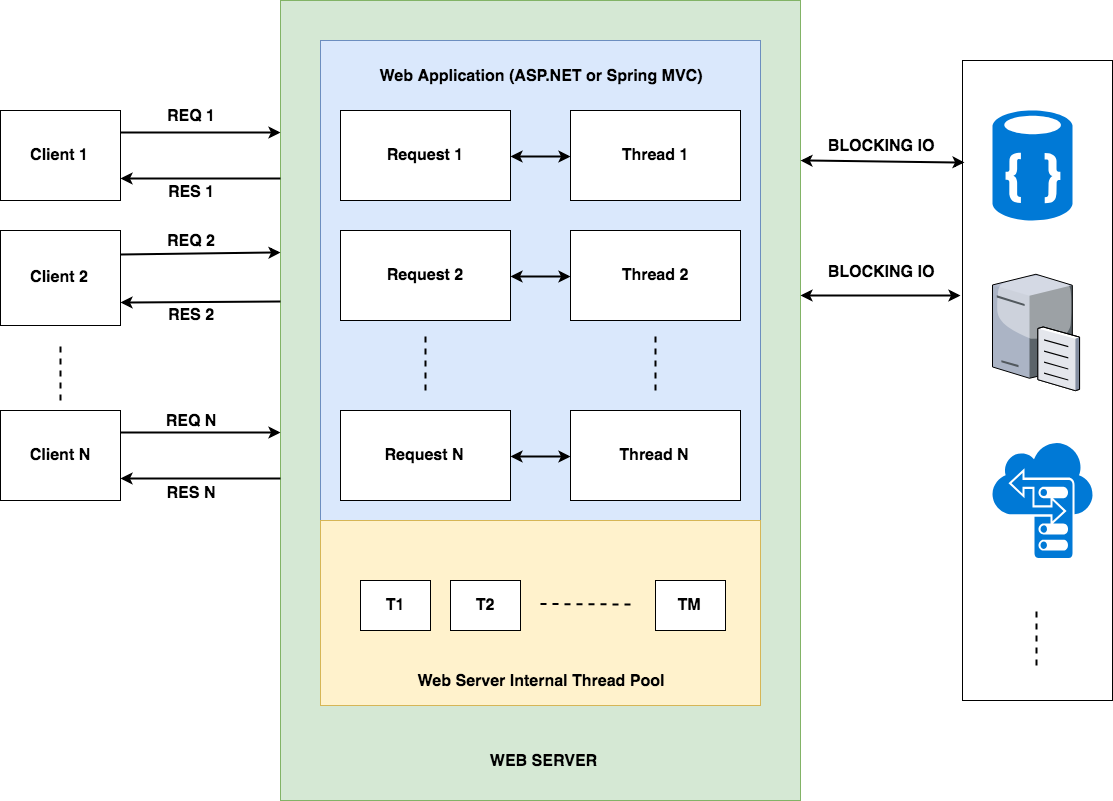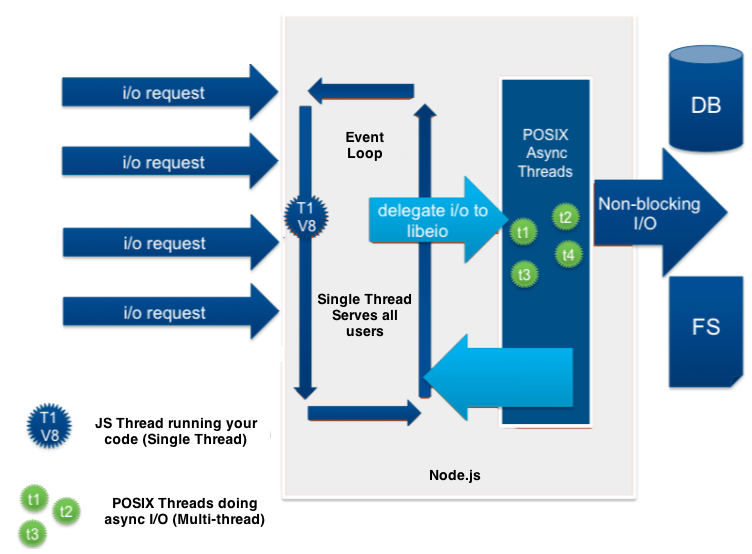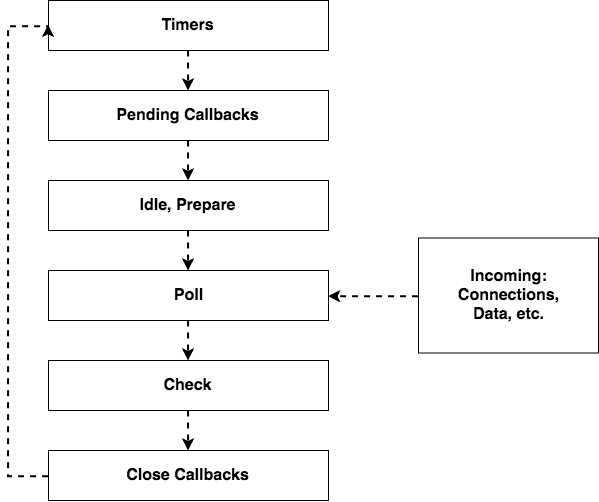Introduction to

Agenda
- JS on Browser? What is Node.js?
- Processing models & inside look
- Blocking and Non-blocking - code compare
- About EventLoop
- Create HTTP Server
- Who is using Node.js and Hosting solutions
What is Node.js?
- Open source & cross-platform project.
- Build on Chrome's JavaScript runtime environment.
- Event driven & Non-blocking IO.
- Real time apps.
- Single threaded.
- Build in Async IO, HTTP/s, file-system etc.
- Ability to do JavaScript on server.
- Act as a web server.

Processing Model
Traditional Web Application

Architecture



Compare code
Blocking Sync VS Non-blocking Async
const fs = require('fs');
const data = fs.readFileSync('/file.md'); // blocks here until file is read
console.log(data);
// moreWork(); will run after console.logSynchronous file read:
Asynchronous file read:
const fs = require('fs');
fs.readFile('/file.md', (error, data) => {
if (error) throw error; // throw error or use logger to log
console.log(data);
});
// moreWork(); will run before console.logCompare code
Warning on mixing Blocking and Non-blocking code
const fs = require('fs');
fs.readFile('/file.md', (err, data) => {
if (err) throw err;
console.log(data);
});
fs.unlinkSync('/file.md'); // File will get delete firstProblem:
Solution: Non-blocking with correct order of execution
const fs = require('fs');
fs.readFile('/file.md', (readFileErr, data) => {
if (readFileErr) throw readFileErr;
console.log(data);
fs.unlink('/file.md', (unlinkErr) => {
if (unlinkErr) throw unlinkErr;
});
});What is Event Loop?

What is Event Loop?

setImmediate() VS setTimeout()
setImmediate():
• Executes once the current Poll phase completes
setTimeout():
• Schedule a script to be run after a minimum threshold in ms elapsed
Timers in Node.js
SetTimeout Function
• The only guarantee is that the timeout will not execute sooner than the declared timeout interval.
setTimeout()
• Schedule a script to be run after a minimum threshold in ms elapsed
function myFunc(arg) {
console.log(`arg was => ${arg}`);
}
setTimeout(myFunc, 1500, 'Hello');Timers in Node.js
SetIntermediate Function
setIntermediate()
• Code will execute after any I/O operations in the current event loop
• And before any timers scheduled for the next event loop
console.log('before immediate');
setImmediate((arg) => {
console.log(`executing immediate: ${arg}`);
}, 'so immediate');
console.log('after immediate');before immediate
after immediate
executing immediate: so immediateTimers in Node.js
Process.NextTick Function
process.nextTick()
• Will run before any Immediates that are set
• Will run before any scheduled I/O
• It non-clearable, meaning once code has been scheduled to execute, the execution cannot be stopped
Timers in Node.js
SetInterval Function
setInterval()
• Infinite loop
• Same rules apply which applies for setTimeout()
function intervalFunc() {
console.log('Cant stop me now!');
}
setInterval(intervalFunc, 1500);Timers in Node.js
Cleaning the future
const timeoutObj = setTimeout(() => {
console.log('timeout beyond time');
}, 1500);
const immediateObj = setImmediate(() => {
console.log('immediately executing immediate');
});
const intervalObj = setInterval(() => {
console.log('interviewing the interval');
}, 500);
clearTimeout(timeoutObj);
clearImmediate(immediateObj);
clearInterval(intervalObj);Script not within an IO cycle
bounded by the performance of the process
// timeout_vs_immediate.js
setTimeout(() => {
console.log('timeout');
}, 0);
setImmediate(() => {
console.log('immediate');
});Input
Output
$ node timeout_vs_immediate.js
timeout
immediate
$ node timeout_vs_immediate.js
immediate
timeoutScript within an IO cycle
Immediate callback will always executed first
// timeout_vs_immediate.js
const fs = require('fs');
fs.readFile(__filename, () => {
setTimeout(() => {
console.log('timeout');
}, 0);
setImmediate(() => {
console.log('immediate');
});
});Input
Output
$ node timeout_vs_immediate.js
immediate
timeout
$ node timeout_vs_immediate.js
immediate
timeoutCreate HTTP Server
const http = require('http');
http.createServer((request, response) => {
const { headers, method, url } = request;
let body = [];
request.on('error', (err) => {
console.error(err);
}).on('data', (chunk) => {
body.push(chunk);
}).on('end', () => {
body = Buffer.concat(body).toString();
// BEGINNING OF NEW STUFF
response.on('error', (err) => {
console.error(err);
});
response.statusCode = 200;
response.setHeader('Content-Type', 'application/json');
// Note: the 2 lines above could be replaced with this next one:
// response.writeHead(200, {'Content-Type': 'application/json'})
const responseBody = { headers, method, url, body };
response.write(JSON.stringify(responseBody));
response.end();
// Note: the 2 lines above could be replaced with this next one:
// response.end(JSON.stringify(responseBody))
// END OF NEW STUFF
});
}).listen(8080);Companies using Node.js







visit: https://nodejs.org/industry
Node.js hosting companies
visit: https://github.com/joyent/wiki/node-hosting





Thank you
Any questions?
find me at www.techjitsu.co.in
Introduction to Node.js
By Tarun Sharma
Introduction to Node.js
Quick introduction to Node.js, history, architecture, and its basics
- 610



